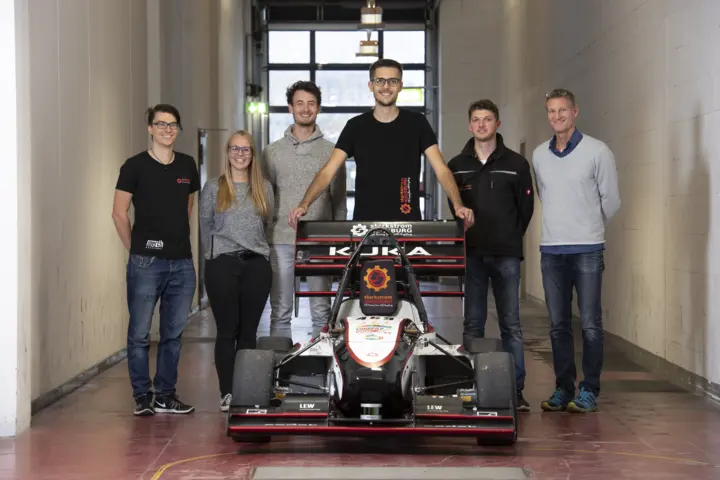Successful teamwork: Christoph Winter (IT), Elena Zehnder (management), Christian Scheglmann (image processing), new captain Dennis Religa, long-serving captain Mathias Pechinger and advisor Prof. Carsten Markgraf – a team that stands together when it matters (left to right).
The driverless e-racing car built by the 'StarkStrom' team incorporates a Kistler speed sensor to ensure that precise position and speed data is constantly available – an essential element in the setup that secured the current world record in the acceleration category for the student team from Augsburg.
Formula Student is Europe's most renowned series of races for young engineers. Two years ago, competitions for driverless single-seaters with all-electric power were added to its program. The 'StarkStrom' team from Augsburg University of Applied Sciences (UAS) competed in this event from the outset – and last season, they secured the world record in the 'Acceleration' category. The cars have to cover 75 meters as quickly as possible on a 3-meter-wide track staked out with cones, and then the vehicle must come to a standstill within 100 meters. At the Hockenheimring in 2018, the Augsburg team left the competition standing with a time of 4.267 seconds and a speed of about 95 km/h.
At Silverstone a few weeks previously, the team even managed to secure first place in the overall ranking for three disciplines: as well as 'Acceleration', the program includes 'Skid Pad' (driving in a horizontal figure of eight) and 'Track Drive' (a course of straights, curves and chicanes, etc.) – from 2019 onwards, 'Autocross' will be added as another discipline. Kistler made its Correvit SF-II ground speed sensor available to the team four weeks before Silverstone.
"Kistler's sensor really was an enormous help for us. In combination with an IMU (Inertial Measurement Unit), the Correvit SF-II supplies precise positional data; it's independent of tire slip, so it compensates perfectly for the drawbacks of the GPS, which is prone to interference."
Mathias Pechinger, former team captain
He has been a member of the team for six years and was its long-serving captain; now he is about to complete his Masters in Applied Research, specializing in driverless mobility. 'Thanks to the sensor's precise feedback on speed, for example, we were able to pass the braking test at our very first attempt.'


![Fastest on the track [object Object]](https://kistler.cdn.celum.cloud/SAPCommerce_Document_Preview/961-215e.webp)